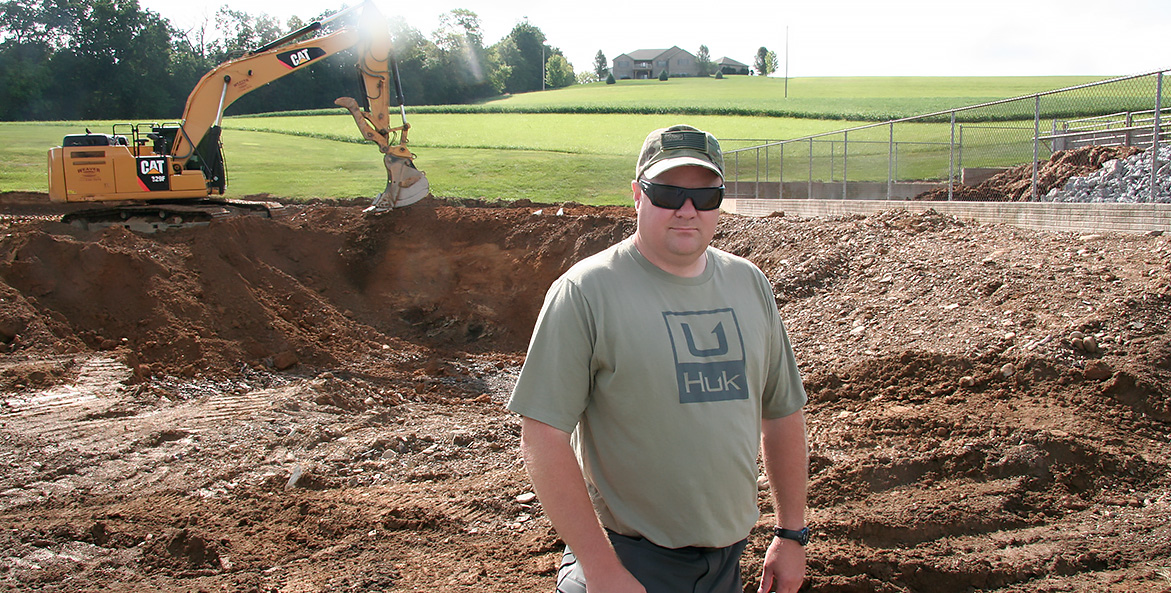Liquid manure doesn’t run off of Greg Strayer’s Cumberland County beef farm and threaten the Conodoguinet Creek any longer, thanks to a new 185,000-gallon storage area made possible with cost-share funds through Pennsylvania’s Agricultural Conservation Assistance Program (ACAP).
“This being a $100,000 project, that’s a big chunk of change,” Strayer said. “If I were to spend that out of my pocket, it would take me 100 years to recoup that money and by that time, I don’t know if I could recoup the nutrient value out of it.”
The Clean Streams Fund (CSF) was passed by the Pennsylvania legislature and signed by former Governor Tom Wolf in 2022, with a comprehensive spending package of $220 million from the American Rescue Plan (ARP). The CSF dedicated $154 million to ACAP as investments to be passed through conservation districts and authorized conservation partners for local agricultural practices, like the storage unit installed by the Strayer Cattle Company, to reduce polluted runoff.
“The great work that Greg Strayer was able to do on his farm proves that ACAP works and deserves even greater support,” said Julia Krall, Chesapeake Bay Foundation (CBF) Executive Director for Pennsylvania. “ARP funding will run out in the next few years, and Pennsylvania will still have a lot of work to do. Increased and sustained investments through ACAP are critical if the Commonwealth is to meet its clean water commitments.”
Strayer, who also works full-time in law enforcement, received 90 percent cost-share funds for the $111,000 storage area from ACAP through the Cumberland County Conservation District (CCCD). The conservation district received a total of $3.5 million in ACAP funding for technical and administration assistance, with $2.8 million to be invested in local projects.
Conservation District Manager Carl Goshorn said three more ACAP projects have been approved to start in the spring, others are being evaluated, and the CCCD could be approving as many as 20 projects.

A new 185,000-gallon manure storage area on Greg Strayer’s beef farm in Cumberland County is reducing polluted runoff into local streams. The storage was made possible with cost-share funds through Pennsylvania’s Agricultural Conservation Assistance Program (ACAP).
BJ Small/CBF Staff
“With ACAP, landowners are able to install best management practices on the farm that they wouldn’t otherwise be able to afford,” Goshorn said. “A lot of farmers have good intentions, but sometimes they cannot afford to put in the practices. ACAP allows practices to go in, in a timely manner and it improves water quality quicker, with less issues with surface water.”
The State Conservation Commission (SCC) is distributing ACAP funds to all 67 counties in the Commonwealth. According to the SCC, $140 million of ACAP’s $154 million have been committed so far for projects like Strayer’s to reduce nutrient and sediment pollution. Of 366 approved applications, 217 have been contracted, 92 are active, and 21 have been completed.
Strayer’s grandfather farmed the 116 acres in Shippensburg for 40 years. When his grandfather passed away in 2016, Greg Strayer, now 48, took the farm over.
[Because of ACAP funding] I’m able to do this and keep this family farm going so that someday, I can pass this farm off to my kids.
In 2019, he replaced an old bank-barn with a new one-story structure that has good air flow, and with ergonomics and the comfort of his beef herd of about 75 animals in mind.
Meanwhile, the worn-out manure storage next to the barn was over 30 years old and leaking liquid manure down the bank, and threatening a small stream that feeds the Conodoguinet, the Susquehanna River, and ultimately the Chesapeake Bay.
Today, the new manure storage area is 65-feet in diameter and with 10-foot-high walls, protects the creek and benefits the farm in that Strayer will be able to apply the natural fertilizer to the soil when the plants can best use it.
Strayer has taken other actions to protect local waters. His farm is enrolled in the Natural Resources Conservation Service’s Conservation Stewardship Program. He worked with CBF for trees on a streamside buffer and he plans to add more on the hillside above the new storage.
On the farm’s 90 tillable acres, Strayer grows wheat, soybeans, grass hay, and multiple species of cover crops, a conservation practice which provides a multitude of soil and stream health benefits.
“As farmers, we take from the land, but we also want to put back and have that quality product,” Strayer said. “If you constantly take from the ground, it’s not going to give you anything.”
The design of the legislation that created ACAP was a collaborative effort between CBF, the Pennsylvania Farm Bureau, and the Penn State College of Agricultural Sciences. The CSF and ACAP were introduced by State Senator Gene Yaw (R-Lycoming).
“Now that funding is available, it’s nice to see some of what I think the legislators and government want to get done, and coming to fruition at my level,” Strayer said. “Then I’m able to do this and keep this family farm going so that someday, I can pass this farm off to my kids.”



